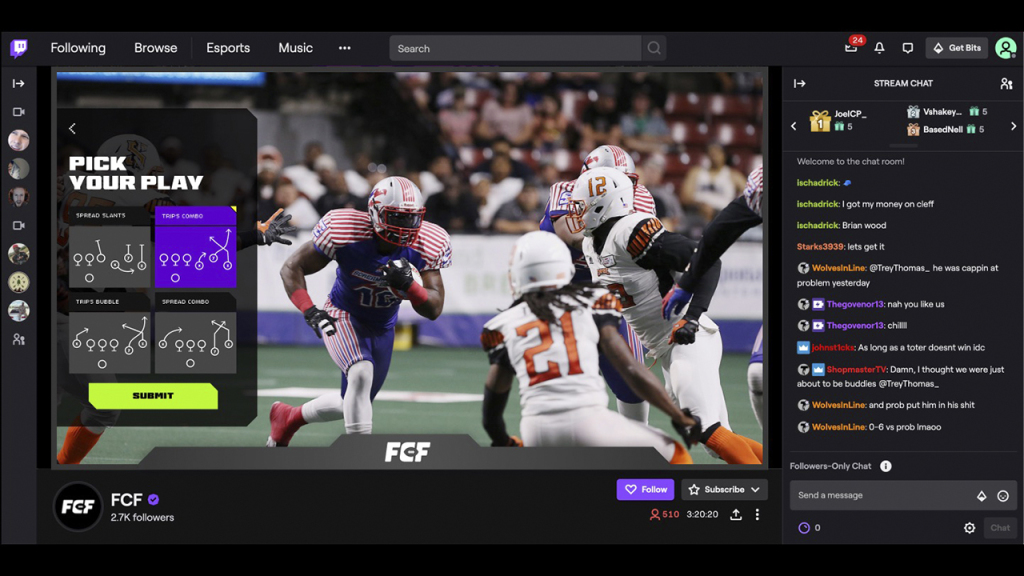Posted: 19/04/2021
The next twelve months could prove crucial for the future of live sports. With even major events such as the UEFA Euro Championships and the Tokyo Olympics likely to be reshaped in the absence of crowds, elite sports and broadcasters must team up to bring fans into the stadium in other ways.
What this means is that broadcasters and leagues need to use technology to start interacting directly with viewers.
“First and foremost, it is critical that sports organizations invest in the infrastructure required to power digital channels, streaming platforms, and augmented and virtual reality solutions,” argues Pete Giorgi, a US Sports Practice Leader at Deloitte.
The good news is that the ground work is already laid.
Fans no longer expect to passively consume broadcast content. They demand entertaining new ways to engage with their team, the players and with friends and the wider community around and during the live game.
The market is ripe for gamification
During the resumption of sports, personalised audio services were introduced that provide alternative commentaries, live audio feeds from the referee’s mic, and crowd sounds for an ‘authentic’ stadium experience. Other innovations from Eleven Sports, BT Sport and Sky Sports among others, focused on social streaming, allowing friends to watch together. This experimentation will only increase in 2021.
Live streaming platforms like Twitch and Facebook Live already offer significantly more interactivity and engagement than linear TV. Live chats, interactive overlays and clickable buttons adjacent to the streams allow for deeper engagement and with that, more customization for gamification experiences and greater potential for monetization.
With real time votes, quizzes, surveys and polls fed back graphically into the live stream fans can be actively engaged – and stay connected. Behavorial and individual data can be collected, analyzed and fed back into improved experiences in a virtuous cycle.
The fan engagement revolution is on
The esports industry has been particularly progressive around rewarding users for their hours spent viewing and watching content. For instance, several publishers offer in-game rewards to viewers of their esports leagues. Riot Games took this concept into a deeper gamified model, with specific ‘watch missions’ that fans could take part in.
Overlays blended with the live OTT live streams can engage fans on the main TV not just on second screens. Amazon Prime Video’s X-Ray stats overlay is a prime example of offering bonus content to viewers and a value add to subscribers. The advance of VR and AR propelled by 5G will only extend the viewer’s role in directing the action.
The natural evolution of this is real time betting. Bookmaking regulations will hinder its growth in different markets but the rise of shared viewing features could pave the way for prediction-based games without money changing hands.
This is happening faster than you think. In the U.S., the live broadcasts of NFL team Arizona Cardinals are to be augmented with sports betting thanks to a deal between betting group Bally’s and regional broadcaster Sinclair. They aim to launch Bally-branded apps for watching Cardinals games not only giving fans the chance to watch the games without a cable or streaming subscription, but to also wager as they watch.
In comments that will resonate with other cash-strapped rights holders Sinclair CEO Chris Ripley argued there was still long-term value in sports rights, but that returns might increasingly come from “reinventing the [network] around gamification, community-based fandom and around direct to consumer.”
Cutting edge cloud native tech is fundamental to success
The monetization of sports from enhanced fan interaction will only happen with the ultra-low latency connectivity and the fastest production tools on the planet to support it.
Blackbird’s key objective is simple: to increase the value of your video – whether this is monetary value or usability value. It does this by hyper-accelerating the speed at which live and non-live video can be accessed, viewed, edited and published – from anywhere.
It’s a genuinely distributed ecosystem meaning that remote production teams can access video fast and frame accurately from any laptop, making it immediately available worldwide.
The unique Blackbird codec and toolset is completely cloud-native, developed for supercharged live workflows and trusted by AAA brands including the NFL, NHL, Eleven Sports, BT, Deltatre, Riot Games, European Tour Golf and Arsenal FC.
The lines between traditional one-way forms of entertainment and interactive content have been blurred. Fans want to participate, play with the experience and ultimately, to control it.

Blackbird is best-of-breed
Jon Hanford - Group CTO, Deltatre



